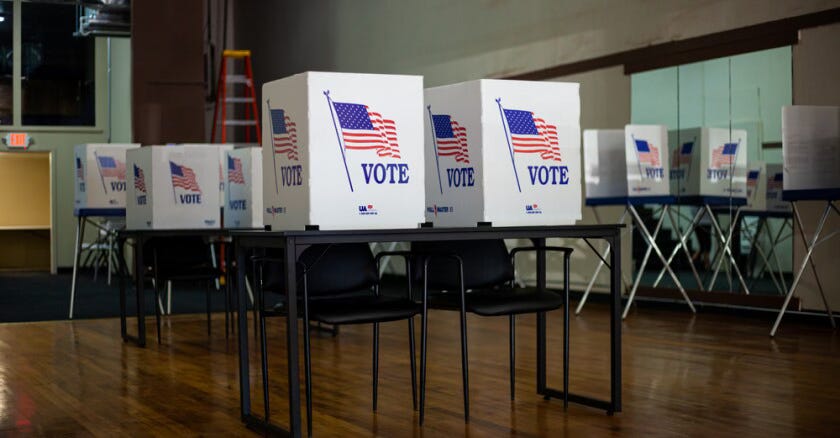President-Elect Trump’s victory shocked many - but should it really be a surprise? It’s time to take a page from the addiction recovery playbook - beginning with “rock bottom”. The road ahead entails short-term pain but offers long-term prosperity.
I want to offer a constructive message drawing on years of personal and professional experience in recovery and working with folks who hit “rock bottom”. Democrats are still licking their wounds, so while this may feel like twisting the knife, asking a better set of questions focused on what is (rather than what should be) will offer a more promising path forward for democracy. If you disagree, please consult the election results and come back.
“Hell is the truth seen too late.”
Thomas Hobbes, Leviathan
TL;DR:
The “rock bottom” framework in political context
The difference that indifference made
A political theory of mind
An anti-establishment reckoning
The way forward and an uncertain future
The “rock bottom” framework in political context
In addiction recovery, "rock bottom" isn't an external situation imposed on a person; it's an internal decision to change. People talk about their twelfth ER visit, a divorce, or living under a bridge as THE turning point that led to their recovery. But the hard truth is that there were often many smaller moments – dismissed as acceptable losses – on the way down. Ultimately, rock bottom is a decision that only someone gives themselves.
Life after rock bottom entails short-term pain but offers long-term prosperity. It means accepting responsibility, processing emotions, adopting harm reduction strategies, therapy, and realigning beliefs and behaviors with society.
Democrats face a similar crossroads in their own political rock bottom moment. Ironically, the word “copium” - a portmanteau of “cope” and “opium” - is being used to describe the self-soothing with the same drug of convictions that led to their electoral loss.
The first step may feel unfair but is clear. People can keep pointing fingers, posting memes, and blaming sexism or bigotry - much as a person experiencing addiction will blame external factors - and thus repeat history. Or they can look inward, accept their shortcomings, and make the necessary changes to reconnect with voters.
(I am not saying Trump voters are correct, or exonerated from their BS - different topic for a different post)
The difference that indifference made
In response to Trump’s demagoguery, Democrats believed they could counter hate with joy and love. Ironically, they received the opposite of love: indifference.
Fifteen million voters who showed up in 2020 stayed home in 2024–flat out. Trump also won the popular vote, a dramatic reversal of voting history, and made surprising gains with young people and Latinos.
Yes, biases exist, but those differences in voter turnout cannot be excused away by the sum total of shifts among voter groups from social issues like reproductive rights or foreign policy. Trump won with 71 million to Harris' 66 million, a -7M to +5M differential in the popular vote.
2020 was a historic year with unique drivers of turnout—people were over-iinformed on news, COVID was fresh, and voting by mail was more accessible. 2024’s landscape was different, and Democrats’ explanations of their loss fit neatly in preconceived notions, signaling a fundamental disconnect with how much the ground shifted under their feet.
People stayed home. Why? Understanding their mindset and grievances is the next step.
A political theory of mind
While voters are not a monolith, several trends and shifts in voter mentality help explain why Trump’s appeal surpassed the Democrats. While I may miss details at the margins here, I have observed several key sentiments:
The economy was not working for broad swaths of the population, with economic inequality more glaring than ever post-pandemic.
Many economically distressed people don’t care about metrics that political elite use to gauge success. What does an unprecedented “soft landing” and outperformance among the G7 matter to someone who doesn’t have time to study inflation mechanics? It’s easier to use the prices of eggs and gas. Their tax bracket is irrelevant.
Strong job reports feel like gaslighting to underpaid and underemployed Americans facing ghost job postings and burnout. One or two 1099 contract jobs doesn’t hold a candle to one full-time W2 job. Voters may be unable to “pierce the corporate veil” of poor hiring excuses, but protest voting is a quiet and safe way to make their frustration consequential.
It’s hard to care about social issues affecting different socioeconomic groups when basic economic needs are unmet. Progressive virtue signaling exhausts people who can barely pay bills despite hard work; perfect conformity doesn’t pay those bills.
Education largely failed in its promise, leading to economic disenfranchisement, social disaffection, and media illiteracy. Furthermore, education increasingly feels like a luxury for the “haves”, while the “have-nots” work to survive.
Higher education increasingly resembles a luxury good that confirms elitism and exclusive social classes more so than it affirms the basic good of upward mobility to those who need it most. This fuels resentment and disengagement.
Performative signaling about foreign policy on elite college campuses signals a distasteful preoccupation with impractical issues, instead of urgent issues like inflation and cost of living.
In a fractured media ecosystem and attention-driven market, profit-driven news forced people into filter bubbles to validate their own truth in “truthiness”. Media influence from Elon Musk, the CCP’s TikTok, and Putin is hard to overstate, but that deserves its own post. This phenomenon swayed young men, who are increasingly economically, sexually, and socially disenfranchised.
Many are exhausted by the “woke” agenda and its unattainable purity standards around DEI.
Mudslinging (however justified) only steels Trump and his supporters against such labels.
The “Shy Tory Effect” is in play: people with even slightly imperfect progressive views often stay silent, fearing backlash. When those with even slightly different views are lumped in with “the fascists,” it silences, rather than changes, their stance.
Recognizing these views is crucial for rebuilding trust. The next step is making amends with the establishment’s grave mistakes.
An anti-establishment reckoning
Frustrations with the two-party system run deep. In 2008, Obama’s grassroots popularity upset Hillary Clinton, the establishment favorite. Eight years later, Sanders’s populist appeal was likewise stifled, with Clinton forced on voters.
In 2016, this could be dismissed as a fluke. In 2024, it’s clear: the numbers reveal a referendum on establishment politics, starting with Democrats’ failure to offer a compelling vision that connects with voter grievances.
The DNC ignored history’s lessons from Obama and Bernie and doubled down on a top-down, “we know best” approach. Assuming that Obama-era demographic-based messaging would continue to carry the day, they communicated an all-too-familiar social contract: compliance in exchange for broken promises. Celebrity endorsements looked like putting lipstick on a pig.
Democrats tactically won on metrics but strategically lost on messaging. From Biden’s delayed decision to step down to Harris’s unchallenged nomination, this election felt preordained. For all her strategic execution, Harris was perceived as an establishment figure. Tragically, her loss meant that women, African Americans, and the truly marginalized became collateral damage.
By overlooking history’s lessons, Democrats once again came off as insular elites more interested in preserving status than connecting with public frustration. Their message was clear: “We’ve decided for you.” For millions who feel voiceless, this was the final straw.
Voters saw in Trump a way to express anti-establishment resentment, even if it was illogical in the way that addiction provides a coping mechanism for resentment and pain.
Trump failed in morality and policy solutions, but more importantly succeeded in offering a “safe space” to express emotional pain without having to voice biases supporters may or may not hold. In his own resentment as a “billionaire” railing against elites, he connected with deep class resentments against a system that has not fulfilled the American Dream. The social consequences of being perceived as fascists and sexists were dismissed as acceptable losses.
The way forward and an uncertain future
2024 puts opponents of Trump’s vision at a crossroads. The indifference of 15 million voters isn't just a statistic; it's a call to action. By understanding voter mindsets, embracing open dialogue, and focusing on tangible issues, Democrats can win back trust. This begins with an internal decision—a political “rock bottom” that could pave the way for a winning strategy.
What’s next? Democrats need to shift from a stance of moral superiority to one of true empathy and understanding, and offer integrity through compelling policies and candidates. Countering hate with love isn't enough when the message doesn't resonate. The party must validate people's experiences, even if they don't align perfectly with progressive ideals. Addressing practical concerns like jobs, the economy, and cost of living remains crucial.
In a post-truth world favoring vibes over tribes and seeing a global backlash against incumbents, the question remains: will the DNC do the work to heal from rock bottom, or will they repeat the addictive cycle that led them here? Bold leadership decisions are needed. Yet if Democrats can confront their role, they can break free from this cycle. Recovery is possible.
“Pain is instructive.”
-Benjamin Franklin









